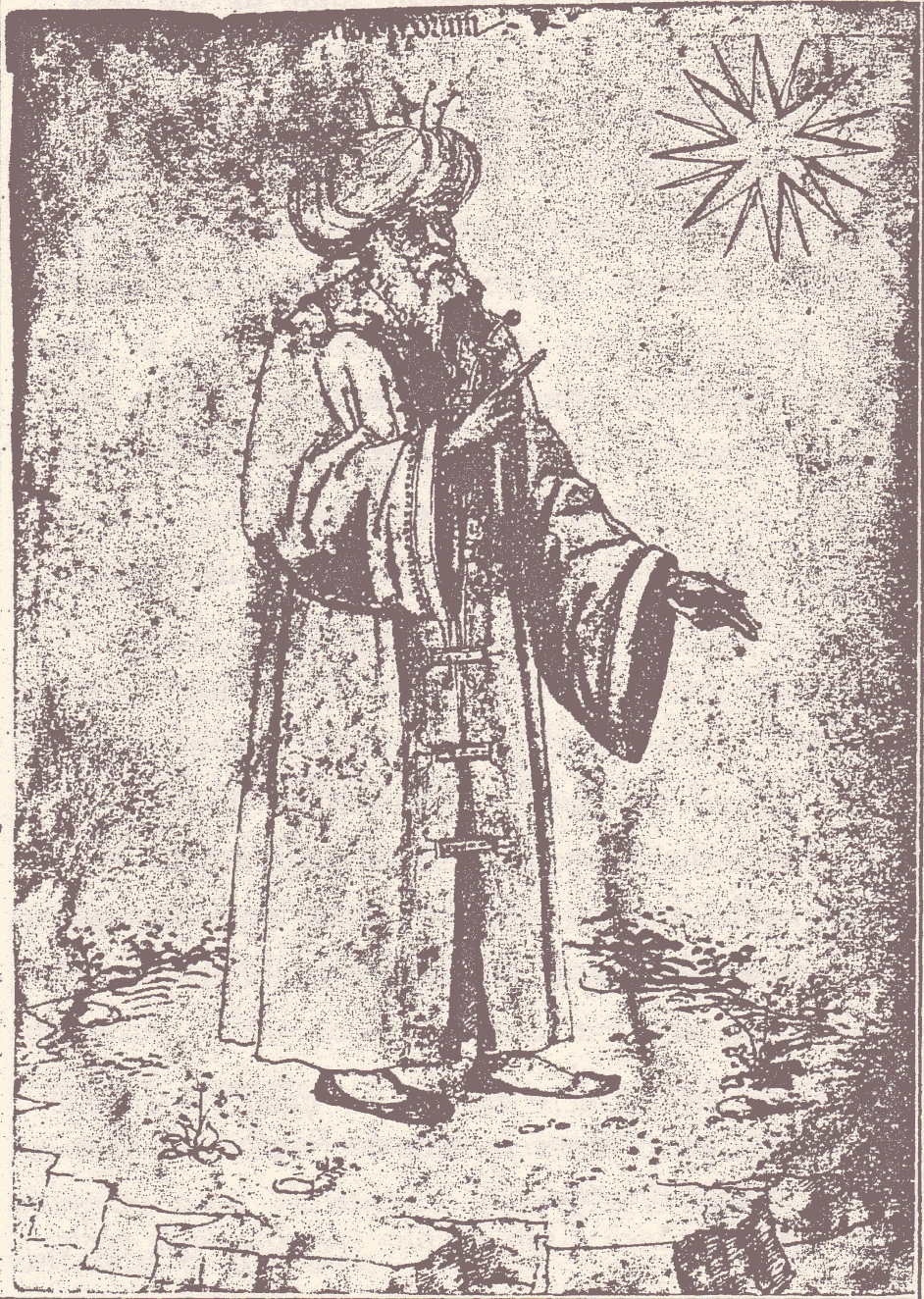
Certain people inquired of Hermes the sage, asking: “With what are science and philsophy joined?” He answered, “With Perfect Nature.” They asked again, saying, “What is the root of science and philosophy?” He said, “Perfect Nature.” Then they questioned him more closely: “What is key by which science and philosophy are opened?” He answered, “Perfect Nature.” They then asked of him, “What is Perfect Nature?” He answered, “Perfect Nature is the spirit of the philosopher or sage linked to the planet that governs him. This is that which opens the closed places of knowledge and by which is understood that which cannot otherwise be understood at all, and from which workings proceed naturally both in sleep and waking.” Book III Chapter 6, The Picatrix transl. John Michael Greer & Christopher Warnock
Perfect Nature and the Hly Guardian Angel
Quoting Liber Antimaquis, attributed to Aristotle, the sage of the Picatrix tells us, “Perfect Nature fortifies those who philosophize, and strengthens their intellect and their wisdom, so that in all their works they may quickly attain fulfillment.” Perfect Nature is described as a tutelary spirit very much akin to the Daimon of Hermeticism and the Holy Guardian Angel of Abramelin.
Although Perfect Nature is associated by the author of the Picatrix with the planet who rules the magician, a notion that is denied by Abraham of Worms who places the Holy Guardian Angel above the power and influence of the planetary archons, there are significant similarities. For one, there is a fourfold pattern that is common to both. For example, once contact is made with the Holy Guardian Angel during the Abramelin ritual, the 4 Great Princes associated with the directions (Oriens, Paimon, Ariton and Amaymon) are summoned and each commanded to provide a familiar. Since the influence of the Holy Guardian Angel is beyond that of the earthly realm, it is these four familiars who do the majority of the magical work undertaken by the Sacred Magician. In the Picatrix, the Perfect Nature is summoned by 4 names who signify the four parts of Perfect Nature:
They gave to the Spirits of Perfect Nature these four names; Meegius, Betzahuech, Vacdez, Nufeneguediz, which are the four parts of the spirits of Perfect Nature named above. When the sages wished to speak about Perfect Nature, they called the, by these four names, which signify the powers of Perfect Nature.
There are other similarities that I might cover in another post, but for now we’ll take a look at how one contacts Perfect Nature.
The Invocation of Perfect Nature
The sage of the Picatrix describes a method to call Perfect Nature by means of a ritual begun when the Moon enters the first degree of Aries and which is to be repeated once or twice a year. The rite is fairly simple and involves setting up an altar with offerings of various oils and wine aligned to the quarters, a candle, and a prayer to be recited along with the names of Perfect Nature.
The candle is lit, the incense is set ablaze, and the prayer recited, at which point Perfect Nature is said to appear and instruct the magician, but little guidance is given on just how the communication is supposed to proceed. A clue can be found in a very poetic description attributed to Hermes:
Hermes, however, said: “When I wished to understand and draw forth the secrets of the workings of the world and its qualities, I put myself above a certain pit that was very deep and dark, from which a certain impetuous wind blew; nor was able to see anything in the pit, on account of its obscurity. If I put a candle in it, straightaway it was extinguished by the wind.
“Then there appeared to me in a dream a beautiful man of imperial authority, who spoke to me as follows: “Put that lit candle in a lantern of glass and the impetuosity of the wind will not extinguish it. You should lower the lantern in the pit, in the middle of which you should dig; thence you may draw forth an image by which, when you have drawn it forth, the wind from the pit will be extinguished, and then you will be able to hold the light there. Then you should dig in the four corners of the pit, and from there you may draw out the secrets of the world and of Perfect Nature, and its qualities, and the generation of all things”.”
The bolded part above is telling and suggests that the technique is describing a method of visionary work to establish contact with Perfect Nature through lucid dreaming. This also seems to be hinted at in another quotation from the same chapter:
Aristotle said furthermore that each sage had his proper virtue infused into him by exalted spirits, by whose powers their senses were closed, their intellects opened, and sciences were revealed to them.
But, can we find any evidence of this spirit contact with Perfect Nature anywhere else?
Ibn Khaldun and the Dream Word of the Perfect Nature
In the Ghayah and other books by practitioners of magic, reference is made to words that should be mentioned on falling asleep so as to cause the dream
vision to be about the things one desires. These words are called by (the magicians) “dream words” (al-halumah).
In the Ghayah, Maslamah mentioned a dream word that he called “the dream word of the perfect nature.” It consists of saying, upon falling asleep and after obtaining freedom of the inner senses and finding one’s way clear (for supernatural perception), the following non-Arabic words: tamaghis ba’dan yaswadda waghads nawfana ghadis.
The person should then mention what he wants, and the thing he asks for will be shown to him in his sleep. A man is said to have done this after he had eaten but little and done dhikr exercises for several nights. A person appeared to him and said, “I am your perfect nature.” A question was put to that person, and he gave the man the information he desired.
With the help of these words, I have myself had remarkable dream visions, through which I learned things about myself that I wanted to know. However, (the existence of such dream words) is no proof that the intention to have a dream vision can produce it. The dream words produce a preparedness in the soul for the dream vision. If that preparedness is a strong one, (the soul) will be more likely to obtain that for which it is prepared. A person may arrange for whatever preparedness he likes, but that is no assurance that the thing for which preparations have been made will actually happen. The power to prepare for a thing is not the same as power over the thing (itself). This should be known and considered in similar cases. God “is wise and knowing.” – p146, The Muqaddimah by Ibn Khaldun transl. Franz Rosenthal
Incidentally, the “dream words of the perfect nature” mentioned above are almost identical to the 4 names attributed to the Perfect Nature in the Arabic Picatrix. There the names are given as Tamaghees, Baghdiswad, Waghidas, and Nufanagadees. Franz Rosenthal, the translator of The Muqaddimah suggests that the names are actually an Aramaic phrase Tmaggesh b’eddan swadh (?) waghdhash nawmtha ghadhesh, which means “You say your incantations at the time of conversation (?), and the accident of sleep happens.” In other words, the names are recited as a focus to hold on to consciousness as sleep takes hold of the body.
This in mind, Hermes’ mysterious description of the method of contacting Perfect Nature starts to make a lot more sense. The “deep pit” is sleep itself which drags one down into the oblivion of unconsciousness if we are not successful in achieving lucidity, the “impetuous wind” is the mental noise that prevents both sleep and lucidity (and which seems to get much stronger at the critical point), the “candle” is the light of awareness itself, and the “glass lantern” that protects awareness from being blown out is the recitation of the names of the Perfect Nature itself.
